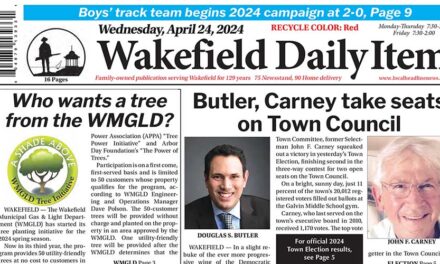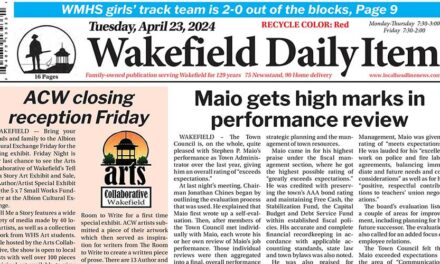By BOB BURGESS
WAKEFIELD — Gov. Charlie Baker’s first budget proposal would mean an overall increase of about three percent to Wakefield in state aid for the fiscal year beginning July 1.
Baker’s administration, facing a huge budget deficit, has nevertheless pledged more assistance for local education and the operation of municipalities across the Commonwealth. Wakefield would get a total of $8,895,036 next year if the governor’s plan stands up, compared to the $8,804,258 the town is getting in state aid this year.
Wakefield schools would receive $5,384,497 in so-called Chapter 70 assistance from the state next year, up from the current allocation of $5,317,017. The school district would get over $100,000 less in charter school reimbursement, however.
Town Administrator Stephen P. Maio this morning said he plans to sit with state Sen. Jason Lewis and Supt. of Schools Dr. Stephen K. Zrike to discuss education funding, which Maio explained is still about $400,000 short of what Wakefield should be getting as part of the schools’ foundation budget.
The governor’s budget plan is the first step in the annual state budget-setting process. The Legislature also submits proposals of its own.
Baker’s team took the wraps off its first state budget yesterday, a $38 billion plan that calls for a 3 percent increase in overall spending but includes no new taxes.
The budget being submitted to the Democratic-controlled Legislature seeks to close what the Republican administration said was a $1.8 billion gap between projected spending and revenues for the fiscal year starting July 1.
While the budget proposal includes more than $1 billion in new spending, the administration said the 3 percent hike contrasted with a nearly 8 percent increase in spending in the current year. That and other measures is enough to close the budget gap, Baker said.
Baker said the plan includes a number of steps to curtail what otherwise would have been greater spending growth, particularly in the state’s Medicaid program, where expenses were projected to rise 16 percent but would rise less than 6 percent if all of his proposals are approved.
“Some people will see some belt-tightening but won’t see wholesale changes in existing services,” Baker said. “In the context of the situation we face and the circumstances we’re dealing with, these are reasonable appropriations.”
Baker said many state programs will be level-funded, meaning they would receive the same amount of money as in the current fiscal year. Baker’s plan would also require some state employees to contribute a greater share to their health insurance.
Baker isn’t proposing any changes in Medicaid eligibility requirements and only one benefits change — eliminating coverage for chiropractic services. The predicted savings would be achieved, in part, by making sure current Medicaid recipients qualify for coverage.
Baker’s plan also calls for a 20 percent hike in transportation funding, including a nearly $65 million hike in state subsidies for the Massachusetts Bay Transportation Authority, the Boston-area transit system that has been beset by breakdowns during a recent stretch of severe winter weather.
State aid to public school districts would rise by $105 million, or 2.4 percent, and unrestricted aid to cities and towns would see a $34 million, or 3.6 percent, hike.
The budget includes a 3 percent net increase for the state’s public colleges and universities but administration officials were not immediately certain if that would be sufficient to continue a two-year freeze on tuition and fees at the University of Massachusetts.
Critics of the proposed budget quickly weighed in.
Supreme Judicial Court Chief Justice Ralph Gants, Trial Court Chief Justice Paula Carey and Trial Court Administrator Harry Spence said they were deeply disappointed.
“This proposed budget does not provide the necessary funding for us to operate or staff the courts in a safe and effective manner,” they said in a statement. “Nor is it fair. The Trial Court has consistently suffered the harshest cuts of any major state organization during the fiscal crisis.”
The Massachusetts Budget and Policy Center faulted Baker for failing to expand access to early education and for relying on what it said was more than a half a billion dollars of “temporary and questionable revenue and savings.”
A coalition of organizations also delivered a petition with 11,000 signatures to Baker and lawmakers on Wednesday demanding that the state spend more money on the MBTA and other parts of the state’s transportation system.
Baker has also proposed doubling the earned income tax credit for low-income working families and ending a state tax credit designed to boost the film industry in Massachusetts.
Baker acknowledged his budget plan is just the start of a longer process with Democratic-controlled House and Senate.
“We’re going to have a big debate with the Legislature about our priorities,” Baker said.
Senate President Stan Rosenberg said lawmakers are committed to working with Baker to help working families.
“As we study the governor’s budget proposal, we will be looking for clear cut evidence that this budget is intended to fulfill these same objectives,” he said.
— The Associated Press’ Steve LeBlanc and Bob Salsberg contributed to this report.




